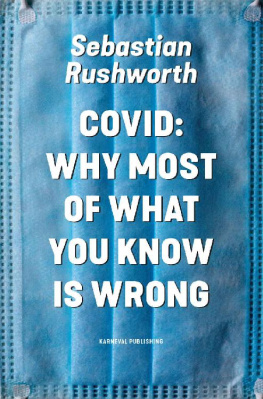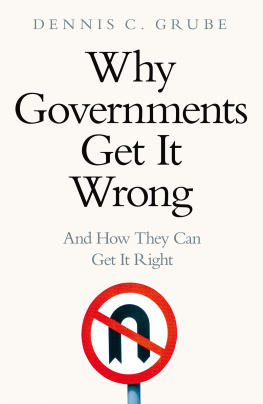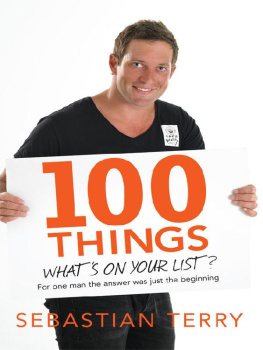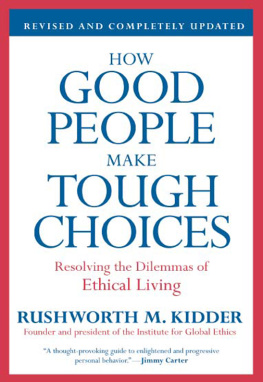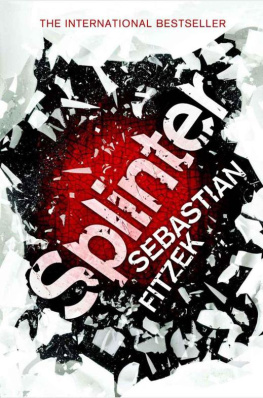Sebastian Rushworth - Covid: Why most of what you know is wrong
Here you can read online Sebastian Rushworth - Covid: Why most of what you know is wrong full text of the book (entire story) in english for free. Download pdf and epub, get meaning, cover and reviews about this ebook. year: 2021, publisher: Karneval Publishing, genre: Politics. Description of the work, (preface) as well as reviews are available. Best literature library LitArk.com created for fans of good reading and offers a wide selection of genres:
Romance novel
Science fiction
Adventure
Detective
Science
History
Home and family
Prose
Art
Politics
Computer
Non-fiction
Religion
Business
Children
Humor
Choose a favorite category and find really read worthwhile books. Enjoy immersion in the world of imagination, feel the emotions of the characters or learn something new for yourself, make an fascinating discovery.
- Book:Covid: Why most of what you know is wrong
- Author:
- Publisher:Karneval Publishing
- Genre:
- Year:2021
- Rating:4 / 5
- Favourites:Add to favourites
- Your mark:
- 80
- 1
- 2
- 3
- 4
- 5
Covid: Why most of what you know is wrong: summary, description and annotation
We offer to read an annotation, description, summary or preface (depends on what the author of the book "Covid: Why most of what you know is wrong" wrote himself). If you haven't found the necessary information about the book — write in the comments, we will try to find it.
Covid: Why most of what you know is wrong — read online for free the complete book (whole text) full work
Below is the text of the book, divided by pages. System saving the place of the last page read, allows you to conveniently read the book "Covid: Why most of what you know is wrong" online for free, without having to search again every time where you left off. Put a bookmark, and you can go to the page where you finished reading at any time.
Font size:
Interval:
Bookmark:

Advance praise
Covid: Why most of what you know is wrong
Covid-19 has triggered a pandemic, and a panic. Many people are bewildered by the avalanche of information, often contradictory. On his blog, Sebastian Rushworth has been a voice of calm reason throughout, trying to help people make sense of what is going on. As a front line doctor in Sweden he has had a front-row seat, and keen understanding of the disease, and our response to it. He takes the reader though some of the science, in order to explain what he is talking about. It is clear, it is reasoned. He believes that the Swedish response, although widely critizised, has been based on good evidence, and may end up being seen as the best way to have handled the pandemic. If you want a guide to what is really going on with Covid-19, then I fully recommend this book. You will end up with a much more complete understanding, which is what we are all looking for, I think.
Dr. Malcolm Kendrick
Sebastian Rushworth
COVID: WHY MOST
OF WHAT YOU KNOW
IS WRONG
KARNEVAL PUBLISHING

Karneval frlag
Mster Pers grnd 2 c
116 35 Stockholm
Sweden
kontakt@karnevalforlag.se
www.karnevalforlag.se
Sebastian Rushworth 2021
ISBN 978-91-88729-82-8
A VERY ODD YEAR
I graduated from medical school in January 2020. Long before starting to study to be a doctor, I had become interested in how diet and health are related, with a particular interest in the paleolithic diet. I think this was borne primarily out of my strong interest in evolution and biology it just made sense that the diet humans were evolutionarily adapted to over the course of millions of years would also be the diet that is healthiest for us.
During my five and a half years of medical training, a few things became clear to me. First, while doctors receive a lot of training in how to deal with medical emergencies, they are taught extremely little about how to avoid chronic disease and maximize long term health, and much of what they are taught is wrong, not supported by the scientific evidence.
There is a famous quote, from David Sackett, one of the founders of a movement that started in the 1980s, and which has since come to be quite influential within medicine. The movement is called evidence based medicine, and its fundamental tenet is that medical interventions should be grounded in what the science actually shows. It is a movement that I strongly believe in. The quote goes something like this: Half of what you learn in medical school will be shown to be completely wrong within five years after youve graduated.
I cannot but agree. It became obvious to me that much of what we learned could not be trusted. This caused me to become highly skeptical, and to develop a strong need to look into the scientific evidence myself directly, in order to see what the science actually shows.
As mentioned, not much space is given to how to avoid chronic disease in medical school. Over the course of the years I was there, I think I received a total of three lectures about nutrition. In other words, three hours during five and a half years were spent learning about how to avoid chronic disease in the first place.
One of those lectures, during the last few months before graduating, struck a very strong chord. The lecturer showed a powerpoint slide, and said, this is your bible. This is what you are going to tell people.
Heres what was on that list:
1. Eat more fruit and vegetables.
2. Eat more fish.
3. Eat more whole grain cereals.
4. Eat less sugar.
5. Eat less saturated fat.
6. Eat less salt.
7. Eat low fat dairy.
8. Eat less meat.
Since I have a strong personal interest in nutrition, and have spent a lot of time going through the science, I knew that more than half of the advice on that list was complete nonsense, not supported by the scientific evidence. And yet we were being told that this was our bible. Just the word chosen showed clearly that this was not science we were being taught, it was religion.
Another problem with medical school is that we were taught what to do in different situations, but we were never given any nuance in terms of the probability of success, or size of benefit, of a treatment. For example, we were taught that, after someone has had a heart attack or a stroke, they should be prescribed a statin. But we were never told what that would really mean for the patient. How much longer could they expect to live?
I decided that, after graduating, I would start a blog about health and medicine, to try and get the truth out as much as possible, both to patients and to colleagues in the medical profession. Apart from helping others, it would also allow me to delve deeper into many of the topics I hadnt been taught in medical school.
Anyway, three days after graduating, I started working in the Emergency Room of one of the hospitals in Stockholm. For the next few months I was too busy to think further about my blog idea. And then, a few months into my new job, came Covid.
It came suddenly, out of nowhere. One day Covid was something happening far away, in other countries, in Italy and South Korea, and China. The next it was everywhere. For a while, it felt like every single Covid test I ordered came back positive. I even had a case where a patient came in with a nose bleed, and for some reason someone decided to take a Covid test. It came back positive.
Now, I dont want to give the impression that the Emergency Room was being overwhelmed, because that would be false. I went from seeing eight patients per shift to seeing two or three. While a very large proportion of the patients were Covid positive, there were in total many fewer patients than usual. All the usual suspects in the Emergency Room were gone.
Official statistics bear this out. They show, for example, that hospital admissions for heart attacks in Stockholm were down 40% during the spring Covid peak. Presumably people were choosing to stay home rather than go to the hospital and risk getting Covid. And presumably this was resulting in unnecessary deaths indirect deaths, not due to the virus itself, but rather due to the hysteria surrounding the virus.
This continued for about a month, and then the Covid patients started to disappear. More and more of the tests came back negative. I noticed that the official statistics were telling the same story. From mid-April until early August there was a continuous decline in the number of people dying of Covid in Sweden.
I follow the medical literature quite closely, and there seemed to be a clear consensus among the experts at that point that Covid was not a seasonal virus. Putting these two pieces of data together, the decline in deaths and the lack of seasonality, I figured that we must have reached the point of herd immunity in Sweden. If both suppositions were true, then nothing else could explain what we were seeing in the data.
I figured that, if that was the case, then the virus could not possibly be anywhere near as deadly as it was being portrayed in the media. Only 6,000 people had died, out of a population of 10 million, and the pandemic was over. So it seemed.
I was given a few weeks holiday in late July, and with more time on my hands, I decided to start the blog that I had been planning for several months. Around this time I had a conversation with my mother, who follows the mainstream news media closely, about Covid. I hadnt been following the news myself, but had rather been going straight to the source for my information, looking at the official statistics and the scientific studies, and it became clear that we had very different world views in relation to Covid.
Font size:
Interval:
Bookmark:
Similar books «Covid: Why most of what you know is wrong»
Look at similar books to Covid: Why most of what you know is wrong. We have selected literature similar in name and meaning in the hope of providing readers with more options to find new, interesting, not yet read works.
Discussion, reviews of the book Covid: Why most of what you know is wrong and just readers' own opinions. Leave your comments, write what you think about the work, its meaning or the main characters. Specify what exactly you liked and what you didn't like, and why you think so.

